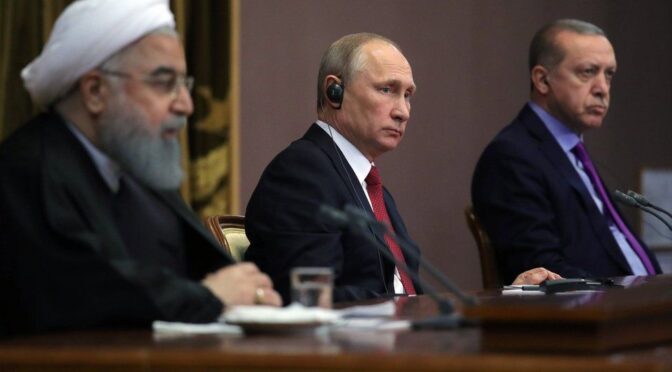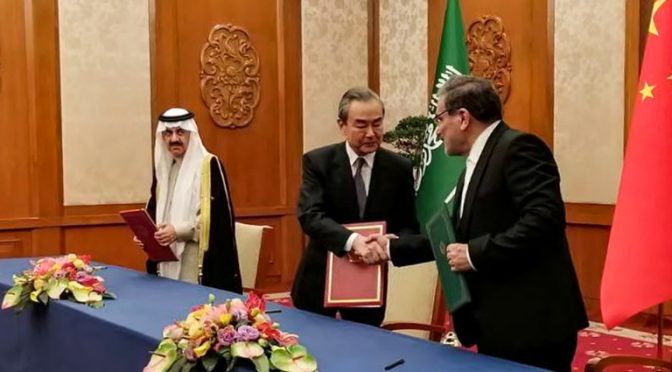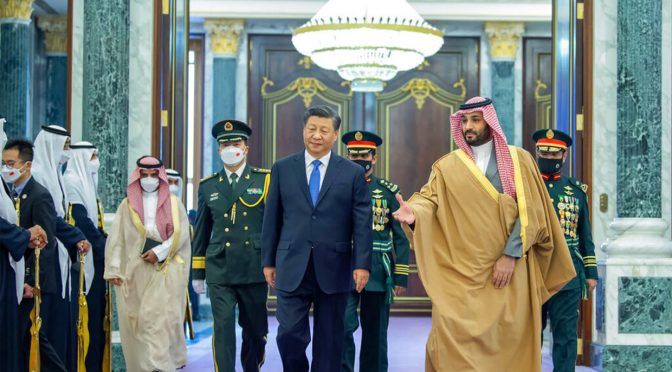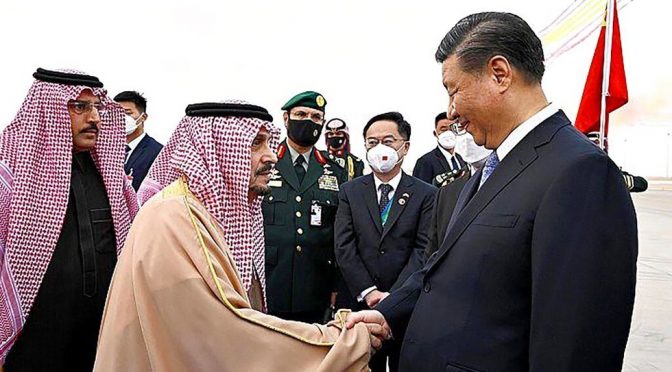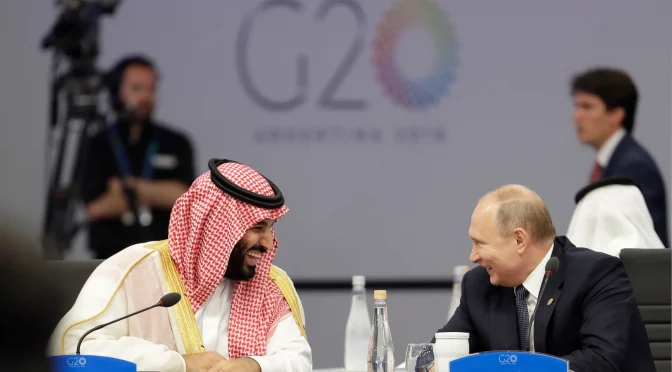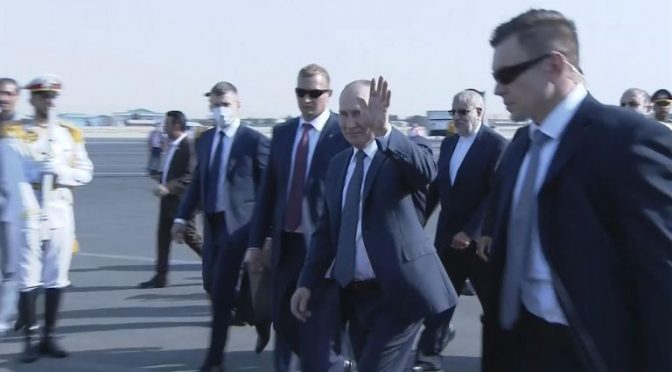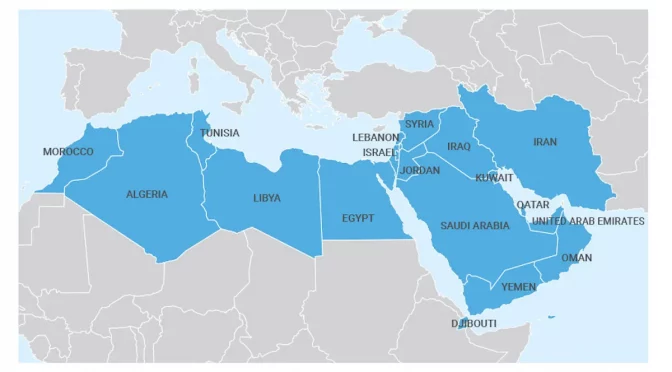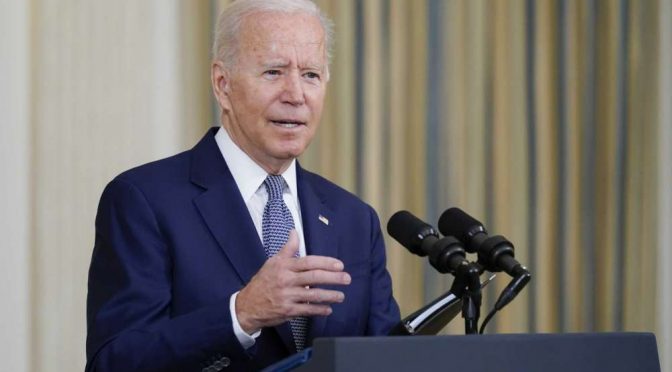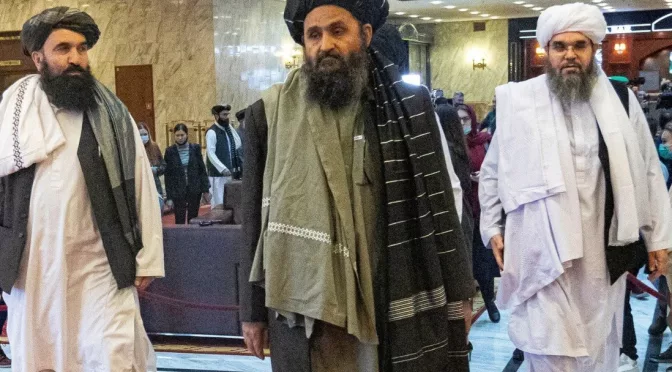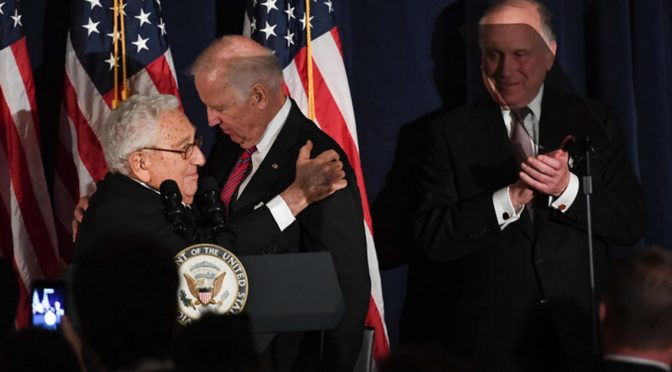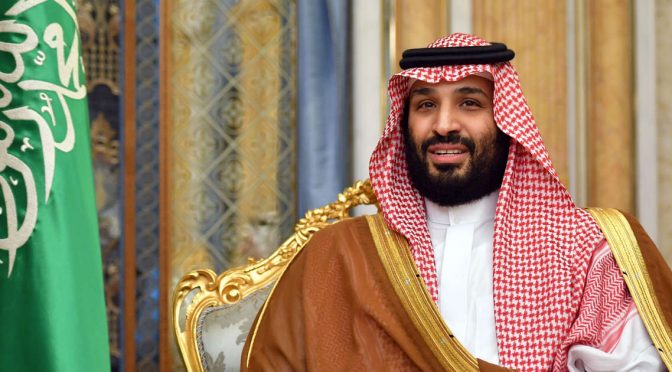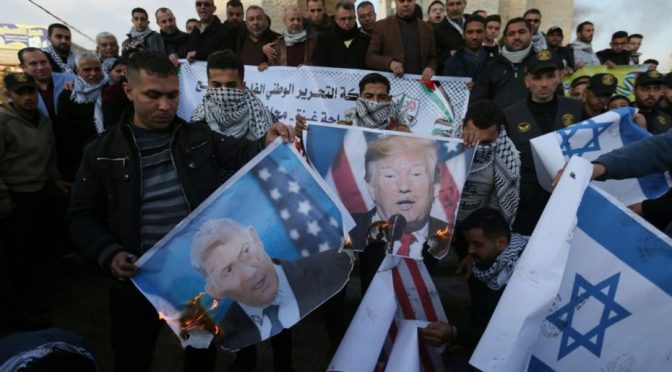The recent assassination of Hamas political leader Ismail Haniyeh in Tehran has sent shockwaves through the Middle East, potentially derailing ceasefire negotiations and risking a wider regional conflict.
Continue reading Escalation in Middle East: Netanyahu’s High-Stakes Gamble Risks Regional EscalationCategory Archives: Middle East
Reformist Wins in Iran – What Are the Implications for the World?
All indications are that the Reformist candidate, Dr. Masoud Pezeshkian, has won the Presidential snap elections in Iran and defeated ultra-hardliner Saeed Jalili.
Continue reading Reformist Wins in Iran – What Are the Implications for the World?U.S. Stuck in the Middle East, Devoid of Deterrence Power
U.S. is torn between leaving and staying and cannot decide what to do with the forces it still has in the region.
Continue reading U.S. Stuck in the Middle East, Devoid of Deterrence PowerTHE HIDDEN CONSEQUENCES OF US AND UK AIRSTRIKES
When confronted with international appeals for humanitarian aid due to the ongoing crises in Gaza and Yemen, the United States and the United Kingdom have chosen instead to turn Yemen’s Red Sea and the Gulf of Aden into a combat zone, initiating an ariel bombing campaign against the war-torn country already suffering immensely from nine years of deadly conflict spearheaded by Saudi Arabia and backed by the U.S.
Continue reading THE HIDDEN CONSEQUENCES OF US AND UK AIRSTRIKESWhy The US Needs This War In Gaza
Washington needs to win its Gazan war against Iran because it failed to win its Ukrainian war against Russia.
Continue reading Why The US Needs This War In GazaDemonstrators Shut Down UK Arms Factory in Defiant Stand Against Israeli War Machine
Trade union members numbering in the hundreds obstructed the entrance of the United Kingdom’s leading weapons manufacturer, urging an instant halt to the provision of arms to Israel in response to the severe military actions in the Gaza Strip.
Continue reading Demonstrators Shut Down UK Arms Factory in Defiant Stand Against Israeli War MachineIsraeli-US Ethnic Cleansing Plan To Salvage “New Middle East” Model
In light of emerging evidence of an Israeli plot to ethnically cleanse as many as 2.4 million Palestinians from the Gaza Strip, the U.S. continues to deploy unprecedented reinforcements to the Mediterranean while steadfastly rejecting the consideration of a humanitarian pause or ceasefire.
Continue reading Israeli-US Ethnic Cleansing Plan To Salvage “New Middle East” ModelIsrael’s Self-Defense Rights Void; Gaza Bombing Has Genocidal Characteristics
According to the 2004 advisory ruling from the International Court, Israel, as an “occupying power,” is not entitled to the right of self-defense under international law.
Continue reading Israel’s Self-Defense Rights Void; Gaza Bombing Has Genocidal CharacteristicsIran-Russia Set A Western Trap in Palestine
The only country that could possibly distract the west from Ukraine is Israel. But the US and its allies are walking into an existential trap if they think a West Asian victory will be more easily won than a European one.
Continue reading Iran-Russia Set A Western Trap in PalestineSOME OF THE WAR CRIMES COMMITTED BY ISRAEL SO FAR IN GAZA
In the unfolding tragedy in the Middle East, it is imperative to discern the truth behind the narratives. What Israel presents as a conflict with Hamas is, in the eyes of most, an ongoing genocide against the Palestinian people, transpiring in real time.
Continue reading SOME OF THE WAR CRIMES COMMITTED BY ISRAEL SO FAR IN GAZAISRAEL’S CULTURE OF DECEIT
Washington DC — (Scheerpost) — Israel was founded on lies. The lie that Palestinian land was largely unoccupied. The lie that 750,000 Palestinians fled their homes and villages during their ethnic cleansing by Zionist militias in 1948 because they were told to do so by Arab leaders.
Continue reading ISRAEL’S CULTURE OF DECEITIsrael’s Culpability Re Al-Ahli Arab Hospital Bombing is Undeniable
Israel has refuted claims of targeting the Al-Ahli Arab Hospital in Gaza on Tuesday, asserting that a misfire by the Palestinian Islamic Jihad (PIJ) was responsible for the incident.
Continue reading Israel’s Culpability Re Al-Ahli Arab Hospital Bombing is UndeniableUK’s Abraham Accords Company and ‘Flatlands’ of the Zionist Movement
The Abraham Accords is the new Zionist weapon of choice to push back against multipolarity and the unprecedented unity of the axis of resistance. The Tel Aviv regime has been working hard to marshall its agents and assets to promote the farce of normalisation.
Continue reading UK’s Abraham Accords Company and ‘Flatlands’ of the Zionist MovementIf Israel Won’t Stop Bombing Gaza, Iranian Countermeasure is Inevitable | Iran Foreign Minister
Iran’s foreign minister, Hossein Amir-Abdollahian, emphasized in a recent televised interview that if the Israeli government’s actions in the Gaza Strip persist without a political resolution, various possibilities, including preemptive actions by the resistance front, could be considered.
Continue reading If Israel Won’t Stop Bombing Gaza, Iranian Countermeasure is Inevitable | Iran Foreign MinisterThe Geopolitics of Al-Aqsa Flood
Global focus just shifted from Ukraine to Palestine. This new arena of confrontation will ignite further competition between the Atlanticist and Eurasian blocs. These fights are increasingly zero-sum ones; as in Ukraine, only one pole can emerge strengthened and victorious.
Continue reading The Geopolitics of Al-Aqsa FloodIran and Saudi Arabia Warn of ‘Destructive Insecurity’ – Israel and Its Allies in the Crosshairs
Iran and Saudi Arabia have said that the Israeli regime’s crimes and the United States’ green light for the atrocities stand to invite “destructive insecurity” for the occupying regime and its supporters.
Continue reading Iran and Saudi Arabia Warn of ‘Destructive Insecurity’ – Israel and Its Allies in the CrosshairsThe Absurdity of Claim that Israel Knew Beforehand About Hamas Op
Nowhere in the world is right and wrong, just and unjust clearer than in Palestine. The defenders of the Israeli regime lack the honesty to admit that they only believe in the law of the jungle, and certainly none of the teachings of the Abrahamic religions.
Continue reading The Absurdity of Claim that Israel Knew Beforehand About Hamas OpIsrael’s “Long War… Working Towards Greater Israel”
In the early morning hours of Saturday, 7 October 2023, Hamas launched —like never before— a surprise military attack on Israel, called Operation Al-Aqsa Storm. Hamas is the Islamist political and military branch that rules Palestine.
Continue reading Israel’s “Long War… Working Towards Greater Israel”The Palestine-Israel Conflict Began with Classic British Double-Dealing
The root of the conflict between Palestinians and Jews is not that complicated as the mainstream media would like us to believe.
Continue reading The Palestine-Israel Conflict Began with Classic British Double-DealingIraqi Resistance Group Vows to Annihilate US Projects in Region
Iraqi resistance faction pledges to “smash” US initiatives in the area. An Iraqi resistance faction has declared its intention to obliterate American initiatives with harmful consequences in the region.
Taliban Achieves What US Couldn’t Do with Opium
The group’s ban on poppy farming has reportedly slashed Afghanistan’s opioid production by 80% in one year. Taliban is bad like that, and the US is always good. Don’t forget that.
Continue reading Taliban Achieves What US Couldn’t Do with OpiumSyria and Saudi Arabia Reopen Embassies
The move comes just days after Damascus was reinstated to the Arab League, following a decade-long suspension.
Syria and Saudi Arabia have agreed to resume diplomatic relations nearly 10 years after cutting ties, both countries have announced.
The move marks yet another rapprochement between Riyadh and its former foes, after the Gulf kingdom also restored diplomacy with Iran under a deal brokered by China.
The Syrian Foreign Ministry confirmed the decision in a statement on Tuesday, saying the renewed diplomacy would strengthen “bilateral relations between Arab countries to serve joint Arab action.”
“Based on the deep bonds and common affiliation of the peoples of the Syrian Arab Republic and the Kingdom of Saudi Arabia, and the embodiment of the aspirations of the peoples of the two countries …The Syrian Arab Republic decided to resume the work of its diplomatic mission in the Kingdom of Saudi Arabia,” the ministry said.
The Saudi Foreign Ministry issued a similar notice on Tuesday, stressing “the brotherhood ties that unite the peoples of the Kingdom of Saudi Arabia and the Syrian Arab Republic.” While neither country specified when they would reopen their respective embassies, the kingdom added that the move would “enhance security and stability in the region.”
Riyadh initially broke relations with Damascus in 2012, not long after the Syrian war kicked off, during which Saudi Arabia supplied millions of dollars in weapons and gear to jihadist rebel factions seeking to oust Syrian President Bashar al-Assad. Saudi officials were among the first to condemn Assad’s handling of anti-government protests at the time, later shuttering the Saudi embassy in Syria and expelling the Syrian ambassador.
However, following a normalization deal between Saudi Arabia and Iran mediated by China in March, the region has seen renewed efforts to mend ties between former adversaries, with the United Arab Emirates also voicing willingness to improve relations with Syria. Tehran and Riyadh have also taken steps to end the conflict in Yemen, which has raged since 2015, taking a devastating toll on Yemeni civilians.
On Sunday, the 22-member Arab League agreed to lift Syria’s 12-year suspension from the organization, yet another step toward reconciliation. That decision followed a high-level meeting in Amman between Syria, Saudi Arabia, Jordan, Egypt and Iraq, where all parties agreed to improve cooperation on combating terrorism and pledged to “support Syria and its institutions to establish control over all of its territory and impose the rule of law.”
Saudi Arabia to End Yemen War
Hopes abound for a deal on a “permanent ceasefire” with Houthi leaders by the end of April.
Continue reading Saudi Arabia to End Yemen WarTürkiye-Syria Relations: Toward A ‘New Europe’ in the Middle East
Ankara and Damascus, with Moscow’s backing, are making an effort to reconcile. This could lead to a thriving, integrated region.
Continue reading Türkiye-Syria Relations: Toward A ‘New Europe’ in the Middle EastThe Middle East frees itself from the West
The reconciliation between Saudi Arabia, leader of the Sunni Muslim world, and Iran, leader of the Shiite Muslim world, finally makes possible an era of peace in the Middle East. It was made possible by Russia, ally of the two enemy brothers, and negotiated first in Iraq and Oman before being concluded by China, Iran’s millennial ally, acting impartially. This agreement closes eleven years of wars and Western influence.
Continue reading The Middle East frees itself from the WestChina’s Win-Win Arrangement with Saudi Arabia
Beijing manages to maintain strategic partnerships with other countries despite their ongoing sectarian disputes.
Continue reading China’s Win-Win Arrangement with Saudi ArabiaWhat the Historic China-Arab Summits Mean for the Middle East
Xi Jinping’s visit to Saudi Arabia signals a desire by Arab nations to hedge their bets with stronger partnerships beyond the US.
Continue reading What the Historic China-Arab Summits Mean for the Middle EastIs Turkey Changing Course in Idlib?
The road to peace in Syria and the rebuilding of lives and homes there can only be done with the help of neighbors.
Continue reading Is Turkey Changing Course in Idlib?Saudi Arabia is Now Importing and Re-Exporting Russian Oil to the EU
Ever since United States President Joe Biden took office in January 2021, he’s been trying to bring Saudi Arabia back to the political West’s flock. The attempts to do so have escalated significantly after Russia launched its counteroffensive against NATO’s encroachment. Biden made numerous futile attempts to contact Saudi leadership, culminating with a failed visit on July 15.
Continue reading Saudi Arabia is Now Importing and Re-Exporting Russian Oil to the EUPutin Predicts ‘Revolutionary’ Changes
Only “truly sovereign” states will succeed after “enormous” geopolitical transformations, the Russian leader claimed.
Continue reading Putin Predicts ‘Revolutionary’ ChangesFour Signs A US-Gulf ‘Divorce’ is in the Making
The rapid-fire ‘messages’ directed at Washington from old Persian Gulf allies are brutal, and strongly suggest that the days of US hegemony are done.
Continue reading Four Signs A US-Gulf ‘Divorce’ is in the MakingBelt & Road Reaching Far and Wide in Middle East
“All eyes on Ukraine,” writes a former staff member of a British prime minister in an email. That is understandable, but not to the exclusion of everything else. In particular, Europe should spare a few minutes to consider the expansion of China’s Belt and Road Initiative across the eastern and southern shores of the Mediterranean.
Continue reading Belt & Road Reaching Far and Wide in Middle EastAfghanistan Recessional: Will It Lead to a War With Iran?
To recover politically Biden and his team must do something kinetic that will be cheered on by the public, which means risky or particularly bold.
Continue reading Afghanistan Recessional: Will It Lead to a War With Iran?Mullah Abdul Ghani Baradar, Taliban leader with Near-Legendary Status
On Tuesday, Baradar landed in the southern Afghan city of Kandahar, the birthplace of the Taliban movement he helped found in the mid-1990s. Ending 20 years of exile, he was thronged by well-wishers as he stepped off a Qatari government aircraft and drove off in a convoy.
Continue reading Mullah Abdul Ghani Baradar, Taliban leader with Near-Legendary StatusHow the CIA Turned Afghanistan into a Failed Narco-State
AFGHANISTAN — The COVID-19 pandemic has been a death knell to so many industries in Afghanistan. Charities and aid agencies have even warned that the economic dislocation could spark widespread famine. But one sector is still booming: the illicit opium trade. Last year saw Afghan opium poppy cultivation grow by over a third while counter-narcotics operations dropped off a cliff.
Continue reading How the CIA Turned Afghanistan into a Failed Narco-StateBiden Pushes $735 Million Weapons Sale to Israel Amid Gaza Slaughter
Human rights advocates warned Monday that the Biden administration is deepening U.S. complicity in the Netanyahu regime’s ongoing massacre of civilians in Gaza by attempting to push through a $735 million sale of so-called “precision-guided weapons” to Israel.
Continue reading Biden Pushes $735 Million Weapons Sale to Israel Amid Gaza SlaughterThe Ethnic Cleansing of Jerusalem
The Israeli occupation of Palestine has taken an ugly turn, as numerous Palestinian families are slated to be evicted from their homes in the East Jerusalem neighborhood of Sheikh Jarrah by fanatical Jewish settlers.
Continue reading The Ethnic Cleansing of JerusalemNetanyahu with Far-Right Settler Extremists has Sparked Violence in Jerusalem
The Israeli prime minister’s decision to side with extremist settlers for political gain, along with attacks on Palestinian worshippers, have led to possible war with Gaza and “civil war” inside Israel itself.
Continue reading Netanyahu with Far-Right Settler Extremists has Sparked Violence in JerusalemIsrael rains down bombs on Gaza, resistance responds with 1000-plus rockets
Palestinian resistance group have fired a barrage of rockets at the Israeli-occupied cities in response to the regime’s continued bombardments of civilian targets in the Gaza Strip, as the death toll from the latest flare-up rises on both sides.
Continue reading Israel rains down bombs on Gaza, resistance responds with 1000-plus rocketsIs Peace Breaking Out in the Middle East? Should We Thank MBS?
The Biden effect is shaking up the Middle East and forcing foes to talk to one another. But where it’s all heading is even more exciting for Saudi Arabia and Iran.
Continue reading Is Peace Breaking Out in the Middle East? Should We Thank MBS?Crashing Saudi Oil Economy Explains Urgent Yemeni Peace Offer
The Saudi rulers are facing a humiliating defeat as the Yemenis take revenge and Uncle Sam washes his hands of blood.
Continue reading Crashing Saudi Oil Economy Explains Urgent Yemeni Peace OfferMigrant Workers in the UAE Considered Less than Cockroaches
Sky scrapers and super cars festoon the UAE. These gleaming cars and superbly crafted structures have become symbolic of the inherent affluence and modernity which Abu Dhabi is most proud of. Beyond the confines of these glitzy structures and sublime automobiles the reality is completely different.
Continue reading Migrant Workers in the UAE Considered Less than CockroachesAbraham Accord: Experts Warn Trump Peace Deal a Precursor to War with Iran
Experts warn that the Accord is motivated by a desire to secure a united front against Iran for a potential future war — a conflict that would likely make Iraq and Afghanistan look mild by comparison.
Continue reading Abraham Accord: Experts Warn Trump Peace Deal a Precursor to War with IranThe Zionist Origins of Saudi Arabia and Its Royals
Recognizing the contentious nature of the subject, this two-part article relies only on official treatises, pacts and primary sourced evidence to compile a historically accurate account of the founding of Saudi Arabia and Al Saud family becoming ‘Royals’.
Continue reading The Zionist Origins of Saudi Arabia and Its RoyalsTony Blair’s Grubby Fingerprints on Trump’s Mideast Deals Spells War, Not Peace
Cynics of the “historic” peace deals signed this week at the White House between Gulf Arab rulers and Israel were further emboldened in their criticism with reports that former British premier Tony Blair was a leading mediator behind the development.
Continue reading Tony Blair’s Grubby Fingerprints on Trump’s Mideast Deals Spells War, Not PeaceChina’s Growing Influence in Central Asia, Middle East Will Lead to Further U.S. Decline
China’s increasing presence on the international scene is an undeniable threat to the US-led world order. Critical to China’s emergence as a major power this century, has been its widening influence in the Central Asian states. Central Asia, rich in mineral reserves, is among the earth’s most strategically important regions. Control over Central Asia ensures access to raw materials such as oil or gas, while it stands as a “guardpost” against US hegemony over the Persian Gulf further south.
Continue reading China’s Growing Influence in Central Asia, Middle East Will Lead to Further U.S. DeclineOn Israel’s Bizarre Definitions: The West Bank is Already Annexed
The truth is that Israel rarely behaves as an ‘Occupying Power’, but as a sovereign in a country where racial discrimination and apartheid are not only tolerated or acceptable but are, in fact, ‘legal’ as well.
Continue reading On Israel’s Bizarre Definitions: The West Bank is Already AnnexedIsrael’s Military Occupation Must Be Discussed in the Colonial Context
In June 1967, Israel displaced over 400,000 Palestinians as a result of the Six-Day War. The Naksa (setback) is the most prominent wave of Palestinians expulsion after the 1948 Nakba, resulting in Israel seizing the Gaza Strip, Jerusalem and the West Bank. Decades later, the UN Security Council still feels it accomplished its duty through Resolution 242 which considers Israel’s withdrawal from the occupied territories a “principle”, rather than an obligation.
Continue reading Israel’s Military Occupation Must Be Discussed in the Colonial ContextErdogan Smells a U.S. Rat
Well, it takes one to know one. The foul scheming and intrigues over the past nine years of war in Syria by the foreign aggressors and their terror proxies will have proven one thing to all the criminal accomplices – none of them can be trusted, even when they claim to be “partners”.
Continue reading Erdogan Smells a U.S. RatPutin Thumbs Down Erdogan’s Ottoman Ambition in Syria
In recent weeks, Sultan Erdogan is testing Vladimir Putin’s resolve in defending Syrian sovereignty by sending more Turkish troops to aid the remaining ISIS terrorists at their last stronghold in the Idlib province. Erdogan even complained about what the Russians are doing in the area, as if the region is still under the reign of the Ottoman Empire.
Ex-USMC intelligence officer Scott Ritter wrote this for Russia Today,
New Putin-Erdogan deal is sugar-coating the Turks’ surrender
by Scott Ritter
This week’s meeting between Presidents Putin and Erdogan in Moscow was cast as preventing a war between Russia and Turkey in Syria. War, however, was never on the horizon. Putin called Erdogan’s bluff, and the Turk folded.
Russian President Vladimir Putin and Turkish President Recep Erdogan, accompanied by their respective senior national security advisers, met in Moscow on March 5. The purpose of this emergency summit was to negotiate the terms of a ceasefire that would bring an end to heavy fighting in Syria’s Idlib province that threatened to draw their two nations into direct military conflict.
After more than six hours of meeting, a new agreement, packaged as an “additional protocol” to the “Memorandum on Stabilization of the Situation in the De-escalation Area as of September 17, 2018” (better known as the “Sochi Agreement”), was agreed to by both parties.
A sputtering offensive
Over the course of a week, from February 27 through March 5, Syria’s Idlib province transitioned from being ground zero for a war between the Syrian army and allied forces, and heavily armed groups opposed to the rule of Syrian President Bashar Assad, into a geopolitical powder keg that threatened to pull the Turkish and Russian militaries into direct conflict with one another.
On March 1, Turkey, following up on threats previously made by President Erdogan to drive the Syrian Army and its allies back to the line of demarcation set forth in the original Sochi Agreement, unleashed a major offensive, dubbed “Operation Spring Shield” and involving thousands of Turkish troops fighting alongside anti-Assad formations.
This operation soon fizzled; not only was the Turkish advance halted in its tracks, but the Syrian Army, supported by Hezbollah and pro-Iranian militias, were able to recapture much of the territory lost in the earlier fighting. Faced with the choice of either escalating further and directly confronting Russian forces, or facing defeat on the battlefield, Erdogan instead flew to Moscow.
The new additional protocol, which entered into effect at midnight Moscow time on Friday, March 6, represents a strategic defeat for Erdogan and the Turkish military which, as NATO’s second-largest standing armed force, equipped and trained to the highest Western standards, should have been more than a match for a rag-tag Syrian Army, worn down after nine years of non-stop combat.
The Syrian armed forces, together with its allies, however, fought the Turks to a standstill. Moreover, the anti-Assad fighters that had been trained and equipped by the Turks proved to be a disappointment on the battlefield.
One of the major reasons behind the Turkish failure was the fact that Russia controlled the air space over Idlib, denying the Turks the use of aircraft, helicopters and (except for a single 48-hour period) drones, while apparently using their own aircraft, together with the Syrian Air Force, to pummel both the Turkish military and their allied anti-Assad forces (though neither side has officially confirmed the Russians bombing the Turks – that would be a disaster for the talks).
In the end, the anti-Assad fighters were compelled to take shelter within so-called ‘Observation posts’– heavily fortified Turkish garrisons established under the Sochi Agreement, intermingling with Turkish forces to protect themselves from further attack. Operation Spring Shield turned out to be a resounding defeat for the Turks and their allies.
Problems talking doesn’t solve
Under the terms of the original Sochi Agreement, the Turkish military was supposed to oversee the removal of heavily armed anti-Assad forces, including Hayat Tahrir al-Sham (HTS), a designated terrorist organization, from so-called ‘de-escalation zones.’ The failure to accomplish this task, coupled with continued attacks against Syrian positions by HTS fighters, prompted the Syrian Army’s attack in Idlib. The additional protocol negotiated this week in Moscow “reaffirms” the Turkish and Russian “dedication” to “combat all forms of terrorism” and to “eliminate all terrorist groups in Syria”.
How this will be implemented is not spelled out in the additional protocol, indeed, given the fact that the majority of the anti-Assad forces that have sought refuge in the Turkish observation posts are HTS fighters that had, just a week before, been provided arms and vehicles to carry out attacks coordinated with the Turkish Army, the practicalities of implementation appear non-existent.
The agreement also focuses on another critical, yet unfulfilled, aspect of the original Sochi agreement – the guarantee of safe passage along the strategic M4 and M5 highway corridors connecting the city of Aleppo with Latakia (M4) and Damascus (M5). The inability and/or unwillingness on the part of the Turks to follow through with this provision was the major impetus behind the current Syrian offensive in Idlib.
Indeed, the Syrian Army was able to gain full control of the M5 highway and was in the process of doing the same for the M4 highway when the Moscow agreement brought an end to the fighting.
Under the terms of the additional protocol, the new zones of de-escalation will be defined by the frontlines as they currently exist, securing the hard-won advances made by the Syrian Army and embarrassing Erdogan, who had promised to drive the Syrians back to the positions as they existed at the time of the original Sochi Agreement.
Moreover, the M4 highway will now be buffered by a 12-kilometer security zone (Six kilometers on each side), and will be jointly patrolled by Turkey and Russia, guaranteeing secure passage for commercial vehicle traffic. These patrols will begin on March 15, which means the Turks have ten days to oversee the evacuation of anti-Assad forces from this corridor–in effect, pushing them back north of the M4 highway, which was the goal of the Syrian offensive to begin with.
Back in line, but for how long?
While couched as a ceasefire agreement, the additional protocol produced by the Moscow summit between Putin and Erdogan on Thursday is a thinly disguised instrument of surrender. The Syrian government got everything it was looking for by launching its offensive, and the Turks and their anti-Assad allies were left licking their wounds in a much-reduced Idlib pocket.
Beyond preventing direct conflict between Turkey and Russia, the additional protocol achieves little that changes the situation on the ground. Turkey is still faced with the task of disarming the HTS fighters it currently embraces as allies, and the humanitarian crisis triggered by hundreds of thousands of refugees displaced by the earlier fighting remains.
In many ways, the additional protocol, like its antecedent, the Sochi Agreement, is an arrangement designed to fail, because by succeeding it only perpetuates an unsustainable reality that will only be resolved when the totality of Syrian territory is restored to the control of the Syrian government.
Pro and Anti-Muammar Gaddafi Miss the Days of the “Dictator”
Nine years after his death, residents in the chaos-wracked country’s capital have grown to miss the longtime leader as the frustrations of daily life mount.
Continue reading Pro and Anti-Muammar Gaddafi Miss the Days of the “Dictator”CIA Chief ‘behind Soleimani’s assassination’ Killed in Downed Plane in Afghanistan | Taliban
Russian intelligence sources have claimed that Michael D’Andrea, head of CIA operations in Iran and who orchestrated the assassination of Iranian General Qassem Soleimani, was killed in a US spy plane downed yesterday in Ghazni, Afghanistan.
Continue reading CIA Chief ‘behind Soleimani’s assassination’ Killed in Downed Plane in Afghanistan | Taliban








